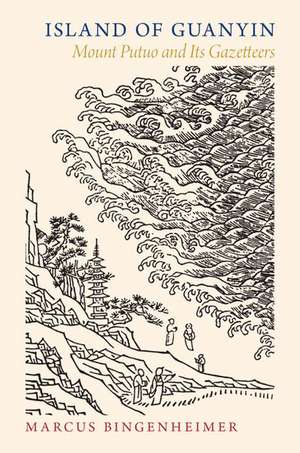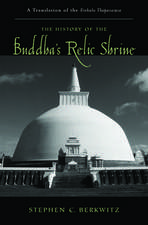Island of Guanyin: Mount Putuo and Its Gazetteers
Autor Marcus Bingenheimeren Limba Engleză Hardback – 5 mai 2016
Preț: 764.07 lei
Preț vechi: 1094.63 lei
-30% Nou
Puncte Express: 1146
Preț estimativ în valută:
146.20€ • 153.06$ • 120.97£
146.20€ • 153.06$ • 120.97£
Carte tipărită la comandă
Livrare economică 25-31 martie
Preluare comenzi: 021 569.72.76
Specificații
ISBN-13: 9780190456191
ISBN-10: 0190456191
Pagini: 298
Ilustrații: 18 illus.
Dimensiuni: 173 x 246 x 28 mm
Greutate: 0.79 kg
Editura: Oxford University Press
Colecția OUP USA
Locul publicării:New York, United States
ISBN-10: 0190456191
Pagini: 298
Ilustrații: 18 illus.
Dimensiuni: 173 x 246 x 28 mm
Greutate: 0.79 kg
Editura: Oxford University Press
Colecția OUP USA
Locul publicării:New York, United States
Recenzii
This engaging book works, and succeeds, at two levels. At one level, it is a cultural history of the island of Putuo (Mount Potalaka), a Buddhist pilgrimage site southeast of Shanghai. At another, it is a study of how gazetteers of this site textualized that history.
In a sense, the Bingenheimer has produced his own mini-gazetteer in English of selected "exhibits" (to use Bingenheimer's term), augmented with analytical guidance for the reader.
Island of Guanyin is a fascinating book. ... The volume is a welcome addition to the current scarcity of English-language literature on the islands of China, and it adds to the body of work concerning islands as holy sites. Its methodologically robust examination of textual history provides a surprising range of insights.
Bingenheimer is to be commended for the close readings he provides of his sources, and for the detailed discussion of exactly how gazetteers were produced.
This book makes major contributions in two areas: studies of Buddhist sacred sites and the value of temple gazetteers in carrying out such studies. Putuo, the sacred island of Guanyin, is the subject of several temple gazetteers and Bingenheimer is the leading expert in the use of them as historiographical sources. He successfully shows how the site and the texts have been mutually constituted through the centuries. An exemplary guide to new approaches to the study of Chinese Buddhism.
Bingenheimer reconstructs a world of maps and miracles, pilgrimage and piracy, landscape and literati, examining the views of a wide cast of characters who worked with and against each other in the compilation of gazetteers from Mount Putuo over the course of five centuries. Consistently engaging and rich in detail, Island of Guanyin both contributes to our understanding of an important pilgrimage site in China, and provides an extended meditation on the relationship between community, place and devotion.
Marcus Bingenheimer's Island of Guanyin: Mount Putuo and its Gazetteers is a major study of two important subjects in the history of Chinese Buddhism: the Buddhist sacred site of Mount Putuo and the historiographical genre of the temple gazetteer. The book is extremely well-written, theoretically engaged yet free of academic jargon, erudite but always engaging, and addressed both to the specialist in Chinese Buddhism and the educated general-reader without prior knowledge of Mount Putuo or the literary genre of the Chinese gazetteer. It is a profoundly original and important work of scholarship that offers significant contributions to multiple fields of intellectual inquiry. It will be essential reading for anyone interested in Buddhist studies, Chinese religion, Chinese history, Chinese literature, book history, or cultural geography.
In a sense, the Bingenheimer has produced his own mini-gazetteer in English of selected "exhibits" (to use Bingenheimer's term), augmented with analytical guidance for the reader.
Island of Guanyin is a fascinating book. ... The volume is a welcome addition to the current scarcity of English-language literature on the islands of China, and it adds to the body of work concerning islands as holy sites. Its methodologically robust examination of textual history provides a surprising range of insights.
Bingenheimer is to be commended for the close readings he provides of his sources, and for the detailed discussion of exactly how gazetteers were produced.
This book makes major contributions in two areas: studies of Buddhist sacred sites and the value of temple gazetteers in carrying out such studies. Putuo, the sacred island of Guanyin, is the subject of several temple gazetteers and Bingenheimer is the leading expert in the use of them as historiographical sources. He successfully shows how the site and the texts have been mutually constituted through the centuries. An exemplary guide to new approaches to the study of Chinese Buddhism.
Bingenheimer reconstructs a world of maps and miracles, pilgrimage and piracy, landscape and literati, examining the views of a wide cast of characters who worked with and against each other in the compilation of gazetteers from Mount Putuo over the course of five centuries. Consistently engaging and rich in detail, Island of Guanyin both contributes to our understanding of an important pilgrimage site in China, and provides an extended meditation on the relationship between community, place and devotion.
Marcus Bingenheimer's Island of Guanyin: Mount Putuo and its Gazetteers is a major study of two important subjects in the history of Chinese Buddhism: the Buddhist sacred site of Mount Putuo and the historiographical genre of the temple gazetteer. The book is extremely well-written, theoretically engaged yet free of academic jargon, erudite but always engaging, and addressed both to the specialist in Chinese Buddhism and the educated general-reader without prior knowledge of Mount Putuo or the literary genre of the Chinese gazetteer. It is a profoundly original and important work of scholarship that offers significant contributions to multiple fields of intellectual inquiry. It will be essential reading for anyone interested in Buddhist studies, Chinese religion, Chinese history, Chinese literature, book history, or cultural geography.
Notă biografică
Marcus Bingenheimer is Assistant Professor of Religion at Temple University.












